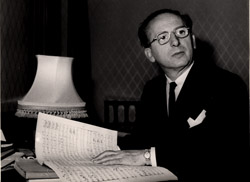|
Home
[Click on images to enlarge]
Miklós Rózsa
Franz Waxman
SCRC Home
|
Franz Waxman, 1906–1967:
A Biographical Memoir by John W. Waxman

Franz Waxman led a variety of musical lives as composer,
conductor, and impresario. He was born in Konigshutte, Upper Silesia,
Germany, on 24 December 1906, and was the youngest of seven children.
No one in the family was musical except Franz, who started piano lessons
at the age of six. His father was an industrialist, and not believing
his son could earn a living in music, encouraged him in a banking career.
He worked for two and one half years as a teller and used his salary to
pay for lessons in piano, harmony, and composition. He quit the bank and
moved to Dresden and then to Berlin to study music. During this period,
he paid for his musical education by playing piano in nightclubs and with
the Weintraub Syncopaters, a popular jazz band of the late 1920s. While
with the band, he began to do their arrangements, and this led to orchestrating
some early German musical films. Frederick Hollander, who had written
some music for the Weintraubs, gave Waxman his first important movie assignment,
orchestrating and conducting Hollander’s score for Josef von Sternberg’s
classic film The Blue Angel. The film’s producer, Erich Pommer,
who was also head of the UFA Studios in Berlin, was so pleased with the
orchestration of the score that he gave Waxman his first major composing
assignment, Fritz Lang’s version of Liliom (1933), which was
filmed in Paris. Pommer’s next assignment, Jerome Kern’s Music
in the Air (Fox Films, 1934), took him to the United States, and he
brought Waxman with him to arrange the music.
Waxman’s first original Hollywood score was The
Bride of Frankenstein (1935), which led to a two-year contract with
Universal as head of the music department. He scored a dozen of the more
than fifty Universal films on which he worked as music director. Among
the best known are The Magnificent Obsession, Diamond Jim,
and The Invisible Ray. Two years after he went to Hollywood, Waxman,
then thirty years of age, signed a seven-year contract with Metro-Goldwyn-Mayer
to compose. He averaged about seven pictures a year, and it was during
this period that he scored such famous Spencer Tracy films as Captains
Courageous, Dr. Jekyll and Mr. Hyde, and Woman of the Year.
In 1937, he was loaned by MGM to David O. Selznick for The Young at
Heart and was nominated for both Best Original Music and Best Score—the
first two of twelve Academy Award nominations he was to receive for the
144 films he scored in his thirty-two years in Hollywood. In 1940, he
was again loaned to Selznick, this time for Rebecca, and was nominated
for his third Academy Award. Waxman left MGM in 1943 and began a long
association with Warner Brothers. Old Acquaintance is from this period.
(Selections from three more of his Warner Brothers scores can be heard
on RCA albums; “Mr. Skeffington” is included in Classic Film
Scores for Bette Davis, and “To Have and Have Not” and “The
Two Mrs. Carrolls” are included in Casablanca: Classic Film Scores
for Humphrey Bogart.)
In 1947, Waxman founded the Los Angeles International Music
Festival, which he was to head for twenty years. World and American premieres
of eighty major works by composers such as Stravinsky, Walton, Vaughan
Williams, Shostakovitch, and Schoenberg were given at the festival. By
1947, Waxman had a busy schedule indeed. In addition to devoting a great
deal of time to the festival, he was in demand at all the major studios,
was guest conducting symphony orchestras in Europe as well as in the United
States, and was composing concert music. For the film Humoresque, he wrote
a special piece based on themes from Bizet’s Carmen, which
was played by Isaac Stern on the soundtrack. The “Carmen Fantasie”
has become part of the standard repertoire and was recorded by Jascha
Heifetz for RCA. Among Waxman’s other concert works are Overture
for Trumpet and Orchestra (based on themes from The Horn Blows at
Midnight), Sinfonietta for String Orchestra and Timpani, The
Song of Terezin (a dramatic song cycle), and Joshua (an oratorio).
Waxman won the Academy Award in 1950 for Sunset Boulevard
and in 1951 for A Place in the Sun. He is the only composer to
have won the award for Best Score in two successive years. It was during
the 1950s and 1960s that he composed some of his most important and varied
scores. These are represented by the above two Academy Award winners as
well as by Prince Valiant and Taras Bulba. He had usually
been associated with romantic films, but now he progressed to epic and
jazzoriented scores. Crime in the Streets, The Spirit of St.
Louis, Sayonara, Peyton Place, and The Nun’s
Story are also from this period, and the complete scores were issued
on soundtrack albums. Franz Waxman received many honors during his lifetime,
including the Cross of Merit from the Federal Republic of Germany, honorary
memberships in the Mahler Society and the International Society of Arts
and Letters, and an honorary doctorate of letters and humanities from
Columbia College. He died 24 February 1967 in Los Angeles at the age of
sixty.
|

